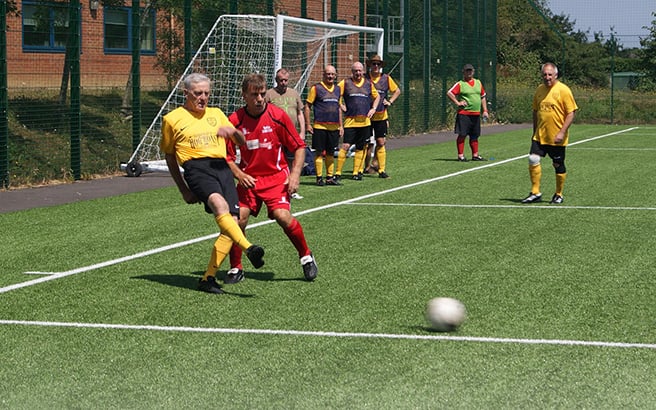April 2022 update: Everyone at World Cancer Research Fund was saddened to hear of Dave’s death from cancer this month. You can read a tribute to Dave and his many achievements in football on the AFC Wimbledon website.
Former left-back Dave retired from football in 1971 at the age of 30, having played for Wimbledon for about 14 years. During his time at the club, they won numerous honours including the amateur FA cup in 1963. But after retiring, Dave didn’t pick up his boots again until he saw an advert for walking football in the newspaper.
“The government were trying to get people involved in exercise and walking football was one of the things. We saw it i the paper and I thought I’d have a try. We played and I thought, ‘I’m still playing quite well’. Well, I must’ve been because afterwards the other players asked, ‘who did you play for?’ So, I thought ‘I must still have it!’. That was about six years ago, and I’ve been playing ever since. I’ve become part of the furniture.”
What is walking football?
Created in 2011, walking football is played on small pitches with small goals. It’s normally played 6-a-side and can be played indoors or outside on grass or artificial grass pitches. Unlike regular 11-a-side football, the ball must not go over shoulder height – so no heading the ball.
But the biggest difference is that no running or jogging is allowed – with or off the ball. Players can walk as fast as they want – “one foot must be in contact with the ground at all times”, according to the rules.
Is walking football for everyone?
 Walking football was designed as a sport for over-50s and the rules allow the game to be played safely by older people.
Walking football was designed as a sport for over-50s and the rules allow the game to be played safely by older people.
It now has a much broader appeal, with men and women up to and including people in their 70s and 80s playing regularly, as well as people with health issues, or returning from injury.
It’s also suitable for people living with and beyond cancer. Dave, who was diagnosed with prostate cancer in 2018, says: “I had a knee replacement operation as well, in 2019, so I didn’t play football for about six months. When I was diagnosed, the oncologist told me I had six and a half years to live. That was nearly two and a half years ago. But I want to prove her wrong and keep fit, and I seem to be going the right way about it. I enjoy life to the full and I still manage to keep myself fit enough to do [walking football].
“I’ve made a lot of friends and it keeps me fit as well. Walking football also helps me forget about what I’ve got. When I’m with other people, I don’t really think about it. Otherwise, I’d be a misery to my family. I try my best to do what I normally do. I’m nearly 80 now and I’m doing alright.”
Health benefits of walking football
- Keep active: exercise can help protect you against cancer as well as reducing your risk of heart disease, stroke and type 2 diabetes. Research has also linked brisk walking with reduced risk of dying from cancer and an improved chance of surviving cancer.
- Stay a healthy weight: an important way of protecting against at least 13 types of cancer.
- tone muscles
- boost metabolism
- increase energy levels
- improve sleep
- improve mental health – playing and socialising with other players are great for improving mood, relieving loneliness and easing stress.
Get involved
Check out the rules or search for your local club: www.thewfa.co.uk

